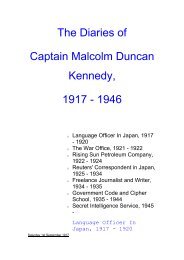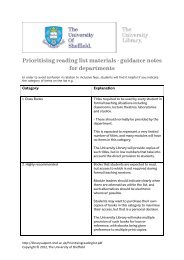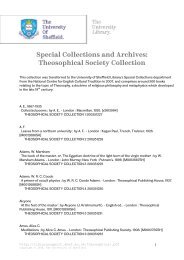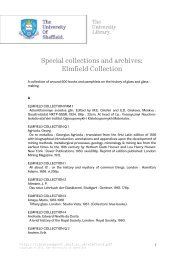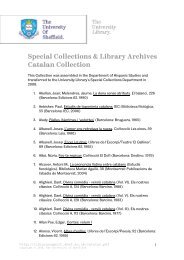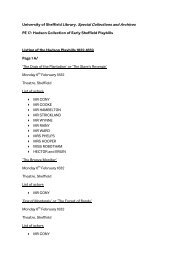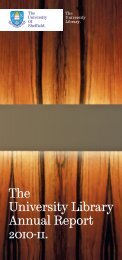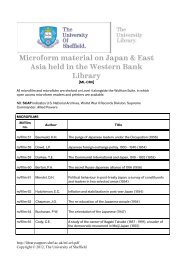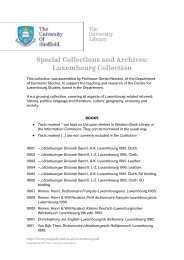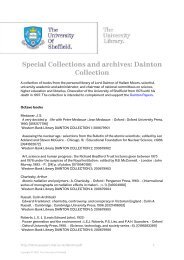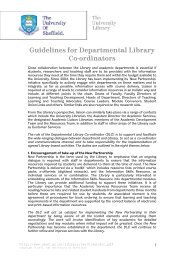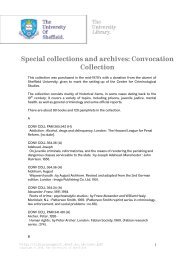The Geoffrey Bullough Collection - Temporary Home Page ...
The Geoffrey Bullough Collection - Temporary Home Page ...
The Geoffrey Bullough Collection - Temporary Home Page ...
Create successful ePaper yourself
Turn your PDF publications into a flip-book with our unique Google optimized e-Paper software.
But the Lord ‗a mercy upon us, Mrs. Cloam, you‘ve a-been married like my poor self;<br />
and you knows what we be, and we knows what you be. Looks ain‘t much to do with<br />
it, after the first week or two. It‘s the cooking and the natur‘, and the not going<br />
contrairy. B‘lieve Miss Dolly would go contrairy to a hangel, if her was j‘ined to him<br />
three days. (p. 23)<br />
―He knows to which side his bread will be buttered,‖ Mr. Swipes had remarked, as a<br />
keen observer. ―If ‗a can only get Miss Faith, his bread ‗ll be buttered to both sides for<br />
life—his self to one side, and her to do the tother. <strong>The</strong> same as I told Mother Cloam—<br />
a man that knoweth his duty to head gardeners, as his noble lordship doth, the same<br />
know the differ atwixt Miss Faith—as fine a young ‗ooman as ever looked into a<br />
pink—and that blow-away froth of a thing, Miss Dolly.‖ (p. 271)<br />
5b.1 Orthography<br />
Elision „a for have; „ooman for woman; j‟ined<br />
Eye dialect natur‟; contrairy<br />
Non standard aspirant hangel (note also concomitant change to article a hangel)<br />
5b.2 Grammar<br />
Non standard conjugation you knows what we be<br />
Non standard pronoun if her was; a for he; his self<br />
5b.3 Vocabulary<br />
archaism a-been; atwixt; doth; knoweth<br />
the tother (especially marked since t would usually represent the determiner)<br />
Idiom blow-away froth of a thing<br />
dialect Lexis the differ<br />
5c. Dialect area(s) represented<br />
South coast (Devon?)<br />
5d. Density of dialect representation<br />
Heavily marked<br />
5e. Location of dialect<br />
Dialect entirely in dialogue<br />
5f. Characteristics of dialect speakers<br />
Male, domestic staff/manual worker, peripheral character<br />
5g. Consistency of representation<br />
No evidence of code-switching<br />
6. Narrative comments on dialects and varieties<br />
Narrative commentary on quality of language. Probably ironic, given often sardonic<br />
tone of text, but two lengthy passages on pp. 16 & 17 describe the appearance in<br />
Church of a local dignitary; the first – in the narrative voice – is marked by high<br />
register, poetic diction, and extravagant adjectives, while the second is the Direct<br />
Speech of the local village shopkeeper, and is marked by dialect vocabulary, Non<br />
standard gammar and archaism. An obtrusive authorial voice interjects between<br />
these two passages with the following commentary:<br />
Mrs. Cheeseman, the wife of Mr. Cheeseman, who kept the main shop in the<br />
village, put this conclusion into better English, when Mrs. Shanks (Harry‘s<br />
mother) came in Monday to buy a rasher and compare opinions. (p. 17)<br />
[emphasis added].<br />
7. Other points of interest<br />
Comment made by Carne (spy / villain / traitor) when plotting in France suggests<br />
varieties not identifiable beyond national boundaries:<br />
http://librarysupport.shef.ac.uk /bullough.pdf<br />
Copyright © 2007, <strong>The</strong> University of Sheffield<br />
9



